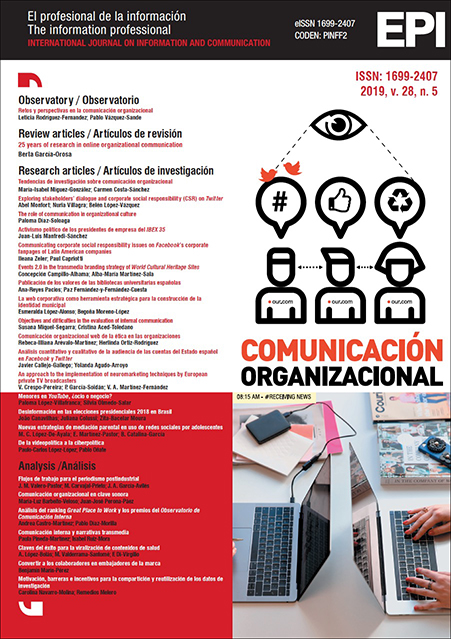Disinformation in the 2018 Brazilian presidential election: An analysis of WhatsApp family groups
DOI:
https://doi.org/10.3145/epi.2019.sep.03Keywords:
Desinformation, Fake news, Post-truth, Manipulation, Elections, Politics, Polítical communication, Social networks, Brazil, WhatsApp.Abstract
This investigation aims to verify what kind of contents was most shared in WhatsApp family groups during the 2018 Brazilian presidential campaign and which percentage contained false information. The relevance of this study is justified because WhatsApp is a closed app and during the campaign was used as a disinformation channel. There was undertaken a quantitative analysis of 472 publications shared in ten groups. The access to this data was possible thanks to the cooperation of citizens who responded to our invitation to participate in the research. The findings show that image with text still corresponds to the most disseminated content in the groups and that 60% of said publications contained false or partially false information. The discoveries corroborate the existence of a circle of disinformation within WhatsApp users.
Downloads
References
Allcott, Hunt; Gentzkow, Matthew (2017). "Social media and fake news in the 2016 election". Journal of economic perspectives, v. 31, n. 2, pp. 211-236. https://doi.org/10.3386/w23089
Bardin, Laurence (1977). Análise de conteúdo. Lisboa: Edií§íµes 70. ISBN: 972 44 0898 1
Bí¢rgăoanu, Alina; Radu, Loredana (2018). "Fake news or disinformation 2.0? Some insights into Romanians´ digital behaviour". Romanian journal of European affairs, v. 18, n. 1, pp. 24-38. http://rjea.ier.gov.ro/wp-content/uploads/articole/RJEA_vol.18_no.1_June2018_art.2.pdf
Breton, Philippe (2001). A palavra manipulada. Lisboa: Editorial Caminho. ISBN: 978 972 21 2115 6
Castells, Manuel (2012). Redes de indignación y esperanza: los movimientos sociales en la era de internet. Madrid: Alianza Editorial. ISBN: 978 84 20609607
Chomsky, Noam; Herman, Edward S. (1988). Manufacturing consent: The political economy of mass media. https://focalizalaatencion.files.wordpress.com/2012/08/herman-chomsky-2002-manufacturingconsent.pdf
Fuchs, Christian (2013). Social media: A critical introduction. London: Sage. ISBN: 978 1 4462 5731 9
Gabielkov, Maksym; Ramachandran, Arthi; Chaintreau, Augustin; Legout, Arnaud (2016). "Social clicks: What and who gets read on Twitter?". Procs of the 2016 ACM Sigmetrics intl conf on measurement and modeling of computer science. https://hal.inria.fr/hal-01281190
Galdón, Gabriel (2001). Desinformación. Método, Aspectos y soluciones. Navarra: Eunsa. ISBN: 978 84 31324186
Habermas, Jí¼rgen (2003). Mudaní§a estrutural na esfera pública: investigaí§íµes quanto a uma categoria da sociedade burguesa. 2.ed. Rio de Janeiro: Tempo Brasileiro. ISBN: 1580193536047
Herring, Susan (2010). "Web content analysis: Expanding the paradigm". In: Hunsinger, Jeremy; Klastrup, Lisbeth; Allen, Matthew M. (eds.). International handbook of internet research. New York: Springer Verlag, pp. 233-249. ISBN 978 1 4020 9789 8
Krippendorf, Klaus (2004). Content analysis: An introduction to its methodology (2nd ed.). Thousand Oaks, CA: Sage. ISBN: 0 7619 1544 3
Martínez-Albertos, José-Luis (1977). El mensaje informativo. Barcelona: ATE. ISBN: 978 84 85047871
Medeiros, Jackson-da-Silva (2013). "Consideraí§íµes sobre a esfera pública: redes sociais na internet e participaí§í£o política". TransInformaí§í£o, v. 25, n. 1, pp. 27-33. https://doi.org/10.1590/S0103-37862013000100003.
November, Alan (2016). Mission critical: How educators can help save democracy. https://novemberlearning.com/assets/MissionCriticalHowEducatorsCanHelpSaveDemocracy.pdf
Recuero, Raquel (2009). Redes sociais sí£o grupos de atores. http://www.ihu.unisinos.br/entrevistas/23660-redes-sociais-sao-grupos-de-atores-entrevista-com-raquel-recuero
Shearer, Elisa; Gottfried, Jeffrey (2016). "News use across social media platforms." Pew Research Center, May 26. https://www.journalism.org/2016/05/26/news-use-across-social-media-platforms-2016
Shirky, Clay (2011). "The political power of social media: Technology, the public sphere, and political change". Foreign affairs, v. 90, n. 1, pp. 28-41. https://www.jstor.org/stable/25800379
Silverman, Craig; Singer-Vine, Jeremy (2016). "Most Americans who see fake news believe it, new survey says". BuzzFeed news, December 6. https://github.com/BuzzFeedNews/2016-12-fake-news-survey
Tandoc Jr., Edson C.; Lim, Zeng-Wei; Ling, Richard (2017). "Defining "˜fake news´". Digital journalism, v. 6, n. 2, pp. 137-153. https://doi.org/10.1080/21670811.2017.1360143
Thorson, Emily (2008). "Changing patterns of news consumption and participation". Information, communication & society, v. 11, n. 4, pp. 473-489. https://doi.org/10.1080/13691180801999027
Tí¶rnberg, Petter (2018). "Echo chambers and viral misinformation: Modeling fake news as complex contagion". PLoS one, v. 13, n. 9, pp. 1-21. https://doi.org/10.1371/journal.pone.0203958
Volkoff, Vladimir (2000). Pequena história da desinformaí§í£o: do cavalo de Tróia à Internet. Lisboa: Editorial Notícias. ISBN: 972 46 1155 8
Wardle, Claire (2017). "Fake news. It´s complicated". Medium.com, February 16. https://medium.com/1st-draft/fake-newsits-complicated-d0f773766c79
Wardle, Claire; Derakhshan, Hossein (2018). "Thinking about "˜information disorder´: formats of misinformation, disinformation, and mal-information". In: Ireton, Cherilyn; Posetti, Julie. Journalism, "˜fake news´ & disinformation. Paris: Unesco, pp. 43-54. ISBN: 978 92 3 100281 6
Downloads
Additional Files
- CV autores (Español (España))
- Foto Canavilhas (Español (España))
- Foto Zita (Español (España))
- Foto Juliana Colussi (Español (España))
- Figura 1 imagen 1 (Español (España))
- Figura 1 imagen 2 (Español (España))
- Figura 1 imagen 3 (Español (España))
- Figura 2 Imagen 1 (Español (España))
- Figura 2 Imagen 2 (Español (España))
- Figura 2 Imagen 3 (Español (España))
Published
How to Cite
Issue
Section
License
Dissemination conditions of the articles once they are published
Authors can freely disseminate their articles on websites, social networks and repositories
However, the following conditions must be respected:
- Only the editorial version should be made public. Please do not publish preprints, postprints or proofs.
- Along with this copy, a specific mention of the publication in which the text has appeared must be included, also adding a clickable link to the URL: http://www.profesionaldelainformacion.com
- Only the final editorial version should be made public. Please do not publish preprints, postprints or proofs.
- Along with that copy, a specific mention of the publication in which the text has appeared must be included, also adding a clickable link to the URL: http://revista.profesionaldelainformacion.com
Profesional de la información journal offers the articles in open access with a Creative Commons BY license.




